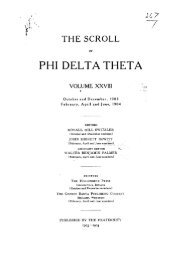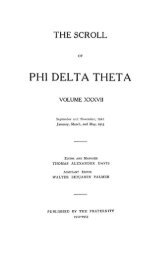1993 Volume 116 No 1–4 - Phi Delta Theta Scroll Archive
1993 Volume 116 No 1–4 - Phi Delta Theta Scroll Archive
1993 Volume 116 No 1–4 - Phi Delta Theta Scroll Archive
Create successful ePaper yourself
Turn your PDF publications into a flip-book with our unique Google optimized e-Paper software.
eceived requests from many people on<br />
this past tour to write about his experiences<br />
with cancer, an idea he is entertaining-<br />
^<br />
"I've had people who have come up to<br />
me and said, 'I've just had surgery, just<br />
had radiation or chemotherapy, and I'm<br />
in a bad way, and for God's sake someday<br />
write a book that at least describes<br />
your own situation going through this.'<br />
Which 1 certainly intend to do."<br />
Throughout the tumultuous changes<br />
in Price's life, he believes the writing<br />
process has actually gotten easier for him.<br />
Part of that ease has come with the<br />
technology of the word processor, but<br />
most of it comes from years of hard work<br />
and understanding the writing process.<br />
Price has compared his writing to rolling<br />
a live grenade into a room.<br />
"I get some kind of fragmentary idea<br />
— which is what I think of as the live<br />
grenade. 1 say, 'It's going to be this man<br />
who meets a teen-age girl accidentally<br />
one day on Fayetteville Street in Raleigh,<br />
and it totally alters his life and the hves of<br />
everyone else he knows for the rest of his<br />
hfe.'<br />
"OK, that's the grenade. Pull the pin<br />
out. Roll it into a room. Here they are, in<br />
the middle of Atkinson Music Company<br />
on Fayetteville Street on such and such an<br />
afternoon in 1956. She walks in the door.<br />
What happens next And I watch the<br />
explosion go off, and I follow the bits and<br />
pieces where they fly.<br />
"And if that sounds idiotically simple,<br />
frankly, I think for a person who's a born<br />
writer and who's writing virtually every<br />
day of his working life for more than 40<br />
years now, it is sort of idiotically simple<br />
to do."<br />
Price's work attempts to illuminate the<br />
mysteries of human relationships. It<br />
paints a picture of how people struggle<br />
with the big questions and come to<br />
understand, love, and hurt each other.<br />
The emotions of his characters are drawn<br />
from his own past, turning his own<br />
history into touching fiction.<br />
"All narrative artists are very much<br />
involved in telling the only real story we<br />
really want to hear, which is: 'History is<br />
the will of a just God who knows me.'<br />
<strong>No</strong>w that either is or isn't true. I hope it<br />
is," he says.<br />
The answer to that question humanity<br />
may never know, but we may be certain<br />
that Reynolds Price is working harder<br />
day and night to find it for all of us. He<br />
has as good a chance, if not better, than<br />
anyone, g<br />
An Excerpt From 'Blue Calhoun'<br />
This starts with the happiest I ever was, though it brought down suffering on<br />
everybody near me. Short as it lasted and long ago, I've never laid it all out yet, not<br />
start to finish. But if I try and half succeed, you may wind up understanding things,<br />
choosing a better road for yourself and maybe not blaming the dead past but living for<br />
the here and now, each day a clean page. At least you'll see how certain things in my<br />
long life have gone down fast as one of those Japanese domino shows where two<br />
million pieces trip each other in hot succession and set off the unexpected jackpot —<br />
an exploding mountain or a rocket blast that hurls men farther than they've yet gone,<br />
to Neptune or worse.<br />
The time I'll tell about ran its course when I was thirty five, then thirty six. Till then<br />
I'd lived a fairly nonmal life, if nomial included some badly drunk years — and I think it<br />
does in America still. So honest to God, I doubt you need to know much about me<br />
before the latter half of that day when everything started streaking downhill. Of course<br />
I'll add the odd event that feels worth knowing or tells a good story. Stories are<br />
something I'm better at than life; and that one year was built like a story, whoever built<br />
it. It had a low start that stoked up fast to such a heat that hinges on doors were<br />
melting away; and pent up people were tearing loose and running for what looked like<br />
daylight till, at some weird invisible signal, everything started cooling again.<br />
And everybody slowed to average speed and drew deep breaths to treat their<br />
burns and wonder if they could stand the sight of each other's faces from then till<br />
death or just for that day. Some said Yes; a few said <strong>No</strong>; and everybody thought I'd<br />
caused the wreck, which may have been true. Even my mother, a certified saint,<br />
called me out to the country house and said "<strong>No</strong>w, son, you've ruined two lives — your<br />
own blood child and the girl you claimed to love so strongly. How do you plan on living<br />
the rest of the time you've got with that on your mind, that blood on your hands"<br />
Blood was a figure of speech at the time, and she well knew it. I'd almost certainly<br />
killed four Germans in the Second War but nothing since. So I said what I believed<br />
was true, "Look, Mother. <strong>No</strong>body's dead." I was technically right.<br />
But her deep blue eyes never flinched, and she said "Far worse than dead — far<br />
worse."<br />
Then I saw that the thing I dreaded had happened. I'd badly harmed three<br />
worthwhile souls that trusted me; and I knew no way on Earth to mend them — not till<br />
your and my past months together, thirty years on. Know this first though (it's some of<br />
the worst you'll know about me) — I drove myself back home from Mother's that late<br />
spring night in a tardy frost with my face grinning each mile of the way. I could see it in<br />
the mirror, dark as it was. My body was still that pleased with the memory; it still is<br />
today. Maybe my mind and heart just figured I'd taken enough from God or fate, my<br />
family and the U.S. Infantry — not to mention the Nazis — to earn me some<br />
substantial relief and nourishment. Whatever, I flat-out gorged myself for twelve full<br />
months. So here much further on in time, I'm hoping to make my slim amends by<br />
telling this history that's all but true.<br />
I'm Blue Calhoun as you well know; and wild as I've been, I still like the sound. The<br />
full name's Bluford and the middle name's August, but there can't be more than ten<br />
people left who know that much about me still — to the world I'm Blue and have<br />
always been. Except for the war and the times I was wild — and our hard time<br />
overseas just now — I've mostly stayed near my birthplace: a capital city, Raleigh,<br />
N.C. When I was a child, Raleigh called itself "The City of Oaks." But don't try to find<br />
an oak these days in the criminal mess that money and the chlorofomed City Council<br />
have made from innocent fertile dirt and what grew in it.<br />
I'm drifting already but here's the start. As I said, I'd climbed the sizable hill of my<br />
thirty fifth birthday — a rough time for men, the downhill side. I think I was sane;<br />
people from all walks of life assured me I was not bad to see. I'd been stone sober for<br />
nineteen months — the longest ever up to that point — and it turned out, I've stayed<br />
sober the rest of my life to this night now. I worked the best job I'd had in years; and to<br />
my knowledge, no part of my life was stan/ed or frozen. I didn't stare off at sunsets<br />
and grieve. I thought I cherished my only spouse, born Myra Burns, a friend since<br />
childhood and your grandmother that you'd have prized.<br />
We'd been married for fifteen years, and Myra had tried her absolute best. As you<br />
well know we had a daughter that I near worshiped named Madelyn (called Mattie or<br />
Matt from the day of her birth, according to how we felt at the moment). Matt was the<br />
finest influence on me of anybody yet. I owed her the worid and was aiming to give it,<br />
minute by minute from here on out — upright kindness and every decent thought and<br />
act I could see she needed. But then that one day fell down on me from a clear spring<br />
sky, no word of waming. It tore the ground from under my feet, and everything round<br />
me shook the way a mad dog shakes a howling child.<br />
Winter <strong>1993</strong> * The <strong>Scroll</strong>

















